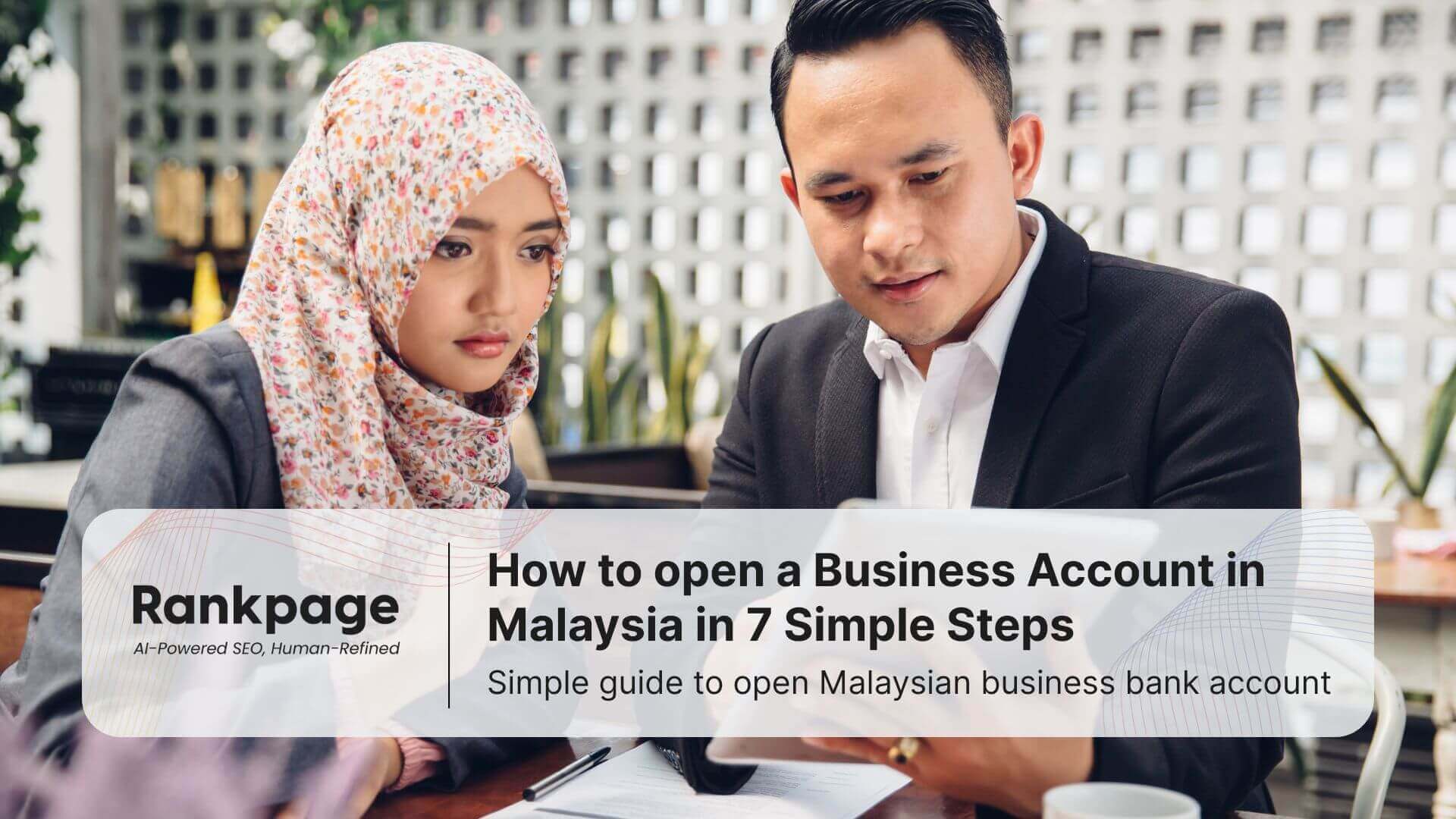Key Takeaways
- Most Malaysian banks require SSM documents (CA2016 sections), identification, and a resolution for business account openings.
- OCBC eBiz offers 100% online onboarding for Malaysian-owned entities with up to 2 local directors/partners. S
- Foreign-owned businesses typically face more intensive verification and often require in-person sign-offs; an introducer/referral is bank-specific (not universal).
- Timelines: as fast as 1–2 working days for eligible local digital onboarding, up to 2–3 weeks for standard cases, and 6–8 weeks where enhanced due diligence applies.
- Choosing the right bank = comparing deposit requirements, onboarding speed, digital readiness, and foreign-ownership support.
If you’re plan on starting you own business in Malaysia, opening a business bank account is one of the most important steps. It keeps your finances clean, helps with tax filing, and is often required to issue invoices or apply for loans.
But between bank visits, required documents, and terms like “board resolution,” the process can feel more complex than it needs to be.
Well, that’s exactly what this guide is for. Today, we will show you how to open a business bank account in Malaysia in 7 simple steps.
Table of Contents
Business Account Opening: Bank & Document Comparison
Entity | Bring (must-haves) | Apply Online? | Typical Time | Good Picks |
Sole Proprietor | MyKad, SSM Form A & D | Yes (start online) → quick branch step common | 1–5 days | Maybank, CIMB |
Partnership | MyKad, Form A & D, Partnership Deed, Partners’/Mandate Resolution | Yes (start online) → branch verify | 3–7 days | RHB, CIMB |
Sdn Bhd | CA2016 docs (s.17, s.58, s.78 if relevant), IDs, Board Resolution | Partial/online; OCBC eBiz is fully online for Malaysian-owned (≤2 directors) | 3–10 days (1–2 if eligible digital) | OCBC, Maybank |
LLP | LLP Cert, LLP Agreement, Partners’/LLP Resolution, Annual Declaration | Start online → branch verify | 1–2 weeks | RHB, Maybank |
Foreign Owned Co. | Above + passports/visas, proof of address, Malaysia activity (invoices/tenancy); introducer only if bank asks | Mostly branch (some segment exceptions) | 2–3 weeks → 6–8 weeks if EDD | HSBC, UOB |
Quick highlights
- Resolutions matter: Board Resolution for Sdn Bhd. Partners’/LLP Resolution for LLP/partnerships (no “board” for LLP).
- Fastest route (locals): OCBC eBiz, fully online if Malaysian-owned with ≤2 directors/partners.
- Deposits vary: OCBC eBiz RM500; Maybank RM1,000; CIMB OBC-i RM3,000; RHB RM1,000–RM3,000 (by entity).
- Foreign-owned: Expect in-person checks and more documents; timelines stretch with enhanced due diligence.
1. Determine Your Entity Type and Bank Requirements
Different entities come with different expectations, and paperwork.
In Malaysia, how you register your business directly affects what documents you’ll need and how complex the bank’s approval process will be. Don’t worry, it’s not add math level of complexity.
- Sole proprietors and partnerships usually go through faster processing, especially if all partners are Malaysian residents.
- Sdn Bhd (private limited companies) require more documentation and internal approvals, such as a board resolution.
- LLP and foreign-owned entities may face longer processing times, stricter vetting, and limited online banking options.
“Malaysian SMEs often get same-day approval if documents are complete and directors can visit the branch in person.”
2. Prepare Certified Business Documents
Banks won’t proceed unless every document is present and certified.
Expect to provide certified true copies, usually verified by a company secretary or compliance officer, depending on your entity type.
For Sdn Bhd (Private Limited Company):
- Section 17: Certificate of Incorporation
- Section 15: Notice of Registration (if requested)
- Section 58: Notification of change in register of directors/managers/secretaries (replaces Form 49)
- Section 78: Return of Allotment of Shares (replaces Form 24, if relevant)
- Constitution (if adopted)
- Directors’ MyKad/passports
- Board Resolution authorising the account and signatories
For Sole Proprietorship / Partnership:
- Form A: Business Registration
- Form D: Certificate of Registration
- MyKad: Copy of proprietor or partners
- Partnership Deed + Mandate Letter (for partnerships)
For LLP (Limited Liability Partnership):
- Notice of Registration / Certificate from SSM
- LLP Agreement
- Annual Declaration
- Certified Resolution to open account
Banks may request recent utility bills or tenancy agreements as proof of business location.
Read more: How Tax Borne by Employer Works in Malaysia
3. Identify KYC & Recommendation Requirements
Know Your Customer (KYC) isn’t just a formality, especially for foreign entities.
KYC is a standard compliance check to verify the legitimacy of your business and the people behind it. While local businesses usually breeze through this step, foreign-owned companies often face tighter scrutiny.
Foreign Businesses May Need:
- A referral/recommendation letter from an existing customer or local contact
- Passport and visa copies of all directors
- A letter of justification explaining why you need a Malaysian account
- Proof of business activity in Malaysia, such as invoices, tenancy agreement, or business plan
Local banks may reject applications if they cannot verify the foreign directors physically or if supporting documents aren’t detailed enough.
4. Evaluate Online vs Branch-Based Applications
Not all business accounts can be opened online, and foreigners have fewer options.
While personal banking in Malaysia is largely digitised, business account openings still rely heavily on branch visits, especially for non-resident directors or complex entities.
However, local SMEs with straightforward setups can now enjoy faster digital onboarding with select banks.
Digital Options for Local SMEs:
- OCBC eBiz: 100% online account opening for Malaysian-owned companies with max 2 local directors. No branch visit required.
- CIMB BizChannel: Allows online form submission, but you’ll still need to visit a branch for final verification.
- Maybank SME First: Offers document upload online, but physical presence is mandatory for activation.
Important for Foreign-Owned Businesses:
Even if documents are submitted online, banks require in-person visits to comply with KYC, due diligence, and internal approvals.
This includes passport verification and sometimes a face-to-face meeting with a bank officer.
Recommendation: Always call the branch ahead to confirm appointment requirements.
5. Submit Documents and Attend In-Person Verification
Final approval happens only after physical verification,even for locals.
Once your documents are ready and submitted (online or in person), banks will schedule a verification session to:
- Cross-check original documents against certified copies
- Conduct brief interviews with company directors (for due diligence)
- Verify the signatories’ identity and collect signatures in person
- Evaluate business legitimacy, especially for newer or foreign firms
If your company has multiple directors or foreign shareholders, ensure everyone who needs to sign is available in Malaysia.
6. Pay Initial Deposit and Maintain Balance
Every bank requires a minimum deposit and ongoing balance, don’t skip this step.
Initial deposit amounts and maintenance requirements vary slightly, but most fall within RM500–RM1,000.
These funds are deposited immediately after approval and must be maintained to keep the account active.
Bank Comparison Table:
Bank | Min Initial Deposit | Ongoing / Notes |
Maybank (SME First) | RM1,000 | No introducer required; branch activation. |
OCBC eBiz | RM500 | RM10 half-yearly if avg. balance < RM1,000. |
CIMB OBC-i | RM3,000 (RM1,000 for clubs/associations) | Online start; branch completion. |
RHB Current Account | RM1,000 (sole prop) / RM3,000 (companies) | Introducer declaration appears in checklist. |
“Failing to maintain the balance may lead to monthly penalties or account suspension.”
Read more: Cashless Payment in Malaysia: What Businesses NEED to Know
7. Account Activation and Online Banking Setup
Once approved, the bank account goes live and tools are issued within days.
After completing verification and making the deposit, your business account will be activated. You’ll receive:
- Account number and access credentials
- Online banking login (may include token device or app setup)
- Cheque book and payment facilities, depending on bank type
- SME tools such as payroll, bulk transfers, or e-invoicing (offered by select banks)
Common Mistakes When Opening a Business Account in Malaysia
“Inactive = closed in 6 months”
Not true. Accounts typically become dormant after 12 months with no customer-initiated transactions; after 7 years of dormancy, balances go to Unclaimed Moneys.
Do this instead: Set a tiny scheduled transfer (e.g., RM1/month) to keep activity going.
Submitting photocopies (not certified)
Banks reject uncertified copies.
Do this instead: bring Certified True Copies from your Company Secretary/authorised officer and the originals for sighting.
Using outdated SSM forms
“Form 9/24/49” are pre-Companies Act 2016 labels.
Do this instead: prepare CA2016 documents (s.17 Certificate of Incorporation, s.58 directors/secretaries, s.78 allotment if relevant).
Assuming every bank supports foreigners or fully online setup
Policies differ; some require branch interviews even after online submission.
Do this instead: call the target branch to confirm onboarding flow, who must attend, and whether an introducer is needed (bank-specific).
Ignoring minimum balance rules
Falling below can trigger fees or restrictions.
Do this instead: check your bank’s initial deposit and monthly/average balance rules; set balance alerts in your banking app.
Best Banks to Open a Business Account in Malaysia
Based on ease of process, SME-friendliness, and online capabilities.
Bank | Highlights |
Maybank | Broad SME coverage; RM1,000 deposit; online start + branch activation. |
OCBC eBiz | Fully online for eligible Malaysian-owned SMEs; RM500 deposit; fast approvals. |
CIMB | Strong BizChannel platform; OBC-i requires RM3,000 initial deposit. |
RHB | Good for LLPs/partnerships; watch for introducer requirement. |
HSBC / UOB | Better for foreign-owned or cross-border needs, some segments may onboard without branch visits. |
Recommendation: For fully online setup, OCBC eBiz is the fastest, if you qualify. For foreigners or complex entities, HSBC or UOB offer better support.
Conclusion: Start Your Business Right, with the Right Bank
Opening a business bank account in Malaysia is more than just a compliance step, it’s a foundation for managing cash flow, building trust, and staying on the right side of the law. From paperwork to approvals, getting it right the first time can save weeks of delay.
Looking to grow your business beyond the bank, and rank online where it matters?
At Rankpage, we don’t handle bank forms, but we do help businesses get found.
From visibility to credibility, the best SEO agency in Malaysia makes sure your business is just as ready online as it is on paper.
Once your bank account is set up, let’s drive real revenue into it, by getting your business seen, heard, and trusted online.
Frequently Asked Questions About Opening a Business Account in Malaysia
Can Foreigners Open A Malaysian Business Bank Account?
Yes, but it requires in-person verification and additional compliance checks.
Which Banks Offer Fully Online Business Account Opening?
Only OCBC eBiz offers full digital onboarding for local SMEs. GXBank GX Biz also offers fully online business accounts but availability is limited (]Grab Merchants).
How Long Does It Take To Open A Business Account?
1–2 working days for OCBC eBiz (eligible locals). Otherwise 2–3 weeks is typical. 6–8 weeks possible for foreign-owned or higher-risk profiles.
Do All Banks Require A Board Resolution?
Sdn Bhd: Yes, Board Resolution is standard. LLP: banks ask for an LLP/partners’ resolution (not a “board” resolution).
Is A Recommendation Letter Always Needed?
Not for local businesses. Foreign-owned companies often need one for due diligence.
What’s the Initial Deposit Required?
Varies. OCBC eBiz RM500. Maybank SME First RM1,000. CIMB OBC-i RM3,000. RHB RM1,000 (sole prop)/RM3,000 (companies).





